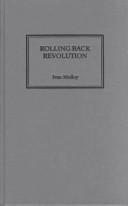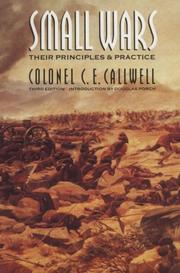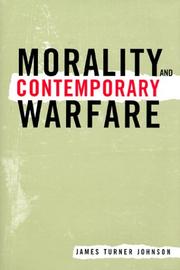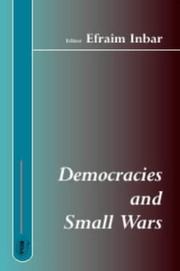| Listing 1 - 10 of 22 | << page >> |
Sort by
|

ISBN: 1849641080 0585433712 9781849641081 0745317073 9780745317076 0745317065 9780745317069 Year: 2001 Publisher: London Sterling, Va. Pluto Press
Abstract | Keywords | Export | Availability | Bookmark
 Loading...
Loading...Choose an application
- Reference Manager
- EndNote
- RefWorks (Direct export to RefWorks)
Low-intensity conflicts (Military science) --- Conflicts, Low-intensity (Military science) --- Low-intensity operations (Military science) --- Low-level conflicts (Military science) --- Operations, Low-intensity (Military science) --- Small wars --- Wars, Small --- Limited war --- United States --- Foreign relations --- Military policy.
Multi
ISSN: 17775345 ISBN: 2738486169 9782738486165 Year: 1999 Volume: 35 Publisher: Paris: L'Harmattan,
Abstract | Keywords | Export | Availability | Bookmark
 Loading...
Loading...Choose an application
- Reference Manager
- EndNote
- RefWorks (Direct export to RefWorks)
Les Cahiers Pierre Michon font partie des publications scientifiques de critique littéraire consacrées à un écrivain particulier. C’est la revue d’une association de lecteurs créée en 2016, « Les Amis de Pierre Michon », qui a pour but de faire mieux connaître l’œuvre littéraire de Pierre Michon et de contribuer à son rayonnement. Cette association encourage les échanges, les études et les recherches en organisant ou en soutenant des colloques, séminaires, journées d’étude, conférences et autres manifestations culturelles en lien avec son œuvre. Elle propose des « Journées Pierre Michon » et anime un site Internet. Elle assure la publication annuelle des Cahiers Pierre Michon qui diffusent textes, études et documents, édités par les Presses universitaires de Rennes. Chaque numéro des Cahiers Pierre Michon s’organise en six rubriques. – La première, sous le titre « Textes de Pierre Michon », propose des textes et entretiens rares ou devenus introuvables ainsi que des inédits (extraits de carnets ou notes de l’écrivain, fac-similés et documents divers répartis dans le Cahier). – Dans la deuxième partie, un « Dossier » rassemble des études sur un thème, un livre, une question ou un aspect de l’œuvre de Pierre Michon. Il s’agit de textes de critique littéraire émanant de colloques ou suscités par le Comité de rédaction de la revue. Ce dernier lance des appels à contributions et procède à l’évaluation scientifique des études, avec l’aide éventuelle de spécialistes français ou étrangers. – La troisième rubrique, « Réception », dresse la bibliographie complète du « Dossier ». – Une quatrième rubrique, « Salutations », rassemble, sur propositions du Comité de rédaction, des textes libres – témoignages, hommages ou « saluts » à Michon… – d’écrivains contemporains, de traducteurs ou de lecteurs. – Une partie « Recensions » présente éventuellement les ouvrages récemment publiés sur l’œuvre de Pierre Michon. – La rubrique finale, « Actualité de l’œuvre », informe de toutes les publications ou manifestations récentes relatives à l’œuvre de Pierre Michon.
Low-intensity conflicts (Military science) --- Security, International --- Conflits de basse intensité --- Sécurité internationale --- Security, International. --- Collective security --- International security --- International relations --- Disarmament --- International organization --- Peace --- Conflicts, Low-intensity (Military science) --- Low-intensity operations (Military science) --- Low-level conflicts (Military science) --- Operations, Low-intensity (Military science) --- Small wars --- Wars, Small --- Limited war --- Social stratification --- National wealth --- Poverty
Book
ISBN: 0801468175 0801451868 132250475X 9780801468179 9780801451867 0801468167 Year: 2013 Publisher: Ithaca : Cornell University Press,
Abstract | Keywords | Export | Availability | Bookmark
 Loading...
Loading...Choose an application
- Reference Manager
- EndNote
- RefWorks (Direct export to RefWorks)
Most wars between countries end quickly and at relatively low cost. The few in which high-intensity fighting continues for years bring about a disproportionate amount of death and suffering. What separates these few unusually long and intense wars from the many conflicts that are far less destructive? In Logics of War, Alex Weisiger tests three explanations for a nation's decision to go to war and continue fighting regardless of the costs. He combines sharp statistical analysis of interstate wars over the past two centuries with nine narrative case studies. He examines both well-known conflicts like World War II and the Persian Gulf War, as well as unfamiliar ones such as the 1864-1870 Paraguayan War (or the War of the Triple Alliance), which proportionally caused more deaths than any other war in modern history. When leaders go to war expecting easy victory, events usually correct their misperceptions quickly and with fairly low casualties, thereby setting the stage for a negotiated agreement. A second explanation involves motives born of domestic politics; as war becomes more intense, however, leaders are increasingly constrained in their ability to continue the fighting. Particularly destructive wars instead arise from mistrust of an opponent's intentions. Countries that launch preventive wars to forestall expected decline tend to have particularly ambitious war aims that they hold to even when fighting goes poorly. Moreover, in some cases, their opponents interpret the preventive attack as evidence of a dispositional commitment to aggression, resulting in the rejection of any form of negotiation and a demand for unconditional surrender. Weisiger's treatment of a topic of central concern to scholars of major wars will also be read with great interest by military historians, political psychologists, and sociologists.
War --- Limited war. --- Low-intensity conflicts (Military science) --- Total war. --- Causes. --- Military policy --- Strategy --- Conflicts, Low-intensity (Military science) --- Low-intensity operations (Military science) --- Low-level conflicts (Military science) --- Operations, Low-intensity (Military science) --- Small wars --- Wars, Small --- Limited war --- Tactical nuclear weapons --- Causes of war
Book
ISBN: 0191839566 0192519808 0192519816 9780192519801 9780198799047 0198799047 9780191839566 Year: 2018 Publisher: Oxford : Oxford University Press,
Abstract | Keywords | Export | Availability | Bookmark
 Loading...
Loading...Choose an application
- Reference Manager
- EndNote
- RefWorks (Direct export to RefWorks)
Carl von Clausewitz has long been interpreted as the paradigmatic thinker of major interstate war. This book challenges this assumption by showing that Clausewitz was an ardent analyst of small war and integrated many aspects of his early writings on partisan warfare and people's war into his magnum opus, 'On War.' It reconstructs Clausewitz's intellectual development by placing it in the context of his engagement with the political and philosophical currents of his own times - German Idealism, Romanticism, and Humanism. The central question that Clausewitz and his contemporaries faced was how to defend Prussia and Europe against Napoleon's expansionist strategy.
Low-intensity conflicts (Military science) --- Clausewitz, Carl von, --- Criticism and interpretation. --- Conflicts, Low-intensity (Military science) --- Low-intensity operations (Military science) --- Low-level conflicts (Military science) --- Operations, Low-intensity (Military science) --- Small wars --- Wars, Small --- Limited war --- Klausewitz, Karl von, --- Klauzevit︠s︡, --- Von Clausewitz, Carl, --- Clausewitz, Karl von, --- Ḳlaʼuzvits, Ḳarl fun, --- קלאוזביץ --- Clausewitz, Carl Philipp Gottfried von,
Book
ISBN: 1317141164 1317141156 128224342X 9786612243424 0754694003 9780754694007 0754677001 9780754677000 9780754677000 9781317141167 9781317141150 6612243422 9781315580395 9781317141143 131558039X Year: 2009 Publisher: Farnham, UK Ashgate
Abstract | Keywords | Export | Availability | Bookmark
 Loading...
Loading...Choose an application
- Reference Manager
- EndNote
- RefWorks (Direct export to RefWorks)
Following on from Ethics Education in the Military which analyzed the existing theory and practice of educating soldiers, sailors and airmen in the ethics of 'old fashioned' warfaring, this volume considers the extent to which such theory and practice is adequate to prepare members of the military to meet the more complex ethical challenges faced when engaging in irregular warfare in the 21st century.
Military ethics --- Asymmetric warfare --- Counterinsurgency --- Low-intensity conflicts (Military science) --- Ethics --- Conflicts, Low-intensity (Military science) --- Low-intensity operations (Military science) --- Low-level conflicts (Military science) --- Operations, Low-intensity (Military science) --- Small wars --- Wars, Small --- Limited war --- Counterguerrilla warfare --- Guerrilla warfare --- Insurgency --- Military art and science --- Study and teaching. --- Moral and ethical aspects.

ISBN: 0803265042 0585331294 9780585331294 080326366X 9780803263666 9780803265042 Year: 1996 Publisher: Lincoln University of Nebraska Press
Abstract | Keywords | Export | Availability | Bookmark
 Loading...
Loading...Choose an application
- Reference Manager
- EndNote
- RefWorks (Direct export to RefWorks)
Low intensity conflicts (Military science) --- Tactics --- Military history, Modern --- Military & Naval Science --- Law, Politics & Government --- Military Science - General --- Modern military history --- Military tactics --- Military art and science --- Conflicts, Low-intensity (Military science) --- Low-intensity operations (Military science) --- Low-level conflicts (Military science) --- Operations, Low-intensity (Military science) --- Small wars --- Wars, Small --- Limited war --- Tactics. --- Military history, Modern.

ISBN: 0585348006 9780585348001 0300078374 Year: 1999 Publisher: New Haven : Yale University Press,
Abstract | Keywords | Export | Availability | Bookmark
 Loading...
Loading...Choose an application
- Reference Manager
- EndNote
- RefWorks (Direct export to RefWorks)
"When is the use of military force by a nation morally justified? Why has the long accepted moral requirement to protect civilians from intentional attack eroded in recent years? How can the tendency toward unrestrained warfare between parties with major cultural differences be controlled? In this book, James Turner Johnson refocuses the moral analysis of war on the real problems of today's armed conflicts. Moral debates about nuclear war and annihilation fail to address the problems of actual contemporary uses of military force, Johnson argues. We must address the type of armed conflict that has emerged at the end of the twentieth century: local wars - often inflamed by historical, ethnic, or religious animosities and usually fought with conventional weapons that can be carried by individual fighters."--Jacket.
War --- Low-intensity conflicts (Military science) --- Military & Naval Science --- Law, Politics & Government --- Military Science - General --- Conflicts, Low-intensity (Military science) --- Low-intensity operations (Military science) --- Low-level conflicts (Military science) --- Operations, Low-intensity (Military science) --- Small wars --- Wars, Small --- Limited war --- War and morals --- Moral and ethical aspects.

ISBN: 1135757569 0429233027 0203610075 9786610056187 0203485424 1280056185 9780203485422 9780714655345 0714655341 9780714684239 0714684236 0714655341 0714684236 9781135757564 9781135757519 1135757518 9781135757557 1135757550 9780429233029 9780203610077 6610056188 9781280056185 Year: 2003 Publisher: London Portland, OR F. Cass
Abstract | Keywords | Export | Availability | Bookmark
 Loading...
Loading...Choose an application
- Reference Manager
- EndNote
- RefWorks (Direct export to RefWorks)
Annotation
Low-intensity conflicts (Military science) --- Democracy. --- Self-government --- Political science --- Equality --- Representative government and representation --- Republics --- Conflicts, Low-intensity (Military science) --- Low-intensity operations (Military science) --- Low-level conflicts (Military science) --- Operations, Low-intensity (Military science) --- Small wars --- Wars, Small --- Limited war --- Political aspects.
Book
ISBN: 1473844614 9781473844612 1473837928 9781473837928 Year: 2016 Publisher: Barnsley, South Yorkshire : Frontline Books,
Abstract | Keywords | Export | Availability | Bookmark
 Loading...
Loading...Choose an application
- Reference Manager
- EndNote
- RefWorks (Direct export to RefWorks)
Low-intensity conflicts (Military science) --- Military art and science --- Military history, Modern. --- Modern military history --- Military history --- Naval history --- Conflicts, Low-intensity (Military science) --- Low-intensity operations (Military science) --- Low-level conflicts (Military science) --- Operations, Low-intensity (Military science) --- Small wars --- Wars, Small --- Limited war --- History. --- Europe --- History, Military.
Book
ISBN: 9587389611 9587389603 9789587389616 9789587389609 9789587389593 Year: 2017 Publisher: Bogotá Editorial Universidad del Rosario
Abstract | Keywords | Export | Availability | Bookmark
 Loading...
Loading...Choose an application
- Reference Manager
- EndNote
- RefWorks (Direct export to RefWorks)
Peace. --- Low-intensity conflicts (Military science) --- Journalism --- Paz. --- Periodismo. --- Writing (Authorship) --- Literature --- Publicity --- Fake news --- Conflicts, Low-intensity (Military science) --- Low-intensity operations (Military science) --- Low-level conflicts (Military science) --- Operations, Low-intensity (Military science) --- Small wars --- Wars, Small --- Limited war --- Coexistence, Peaceful --- Peaceful coexistence --- International relations --- Disarmament --- Peace-building --- Security, International --- War --- Colombia.
| Listing 1 - 10 of 22 | << page >> |
Sort by
|

 Search
Search Feedback
Feedback About UniCat
About UniCat  Help
Help News
News